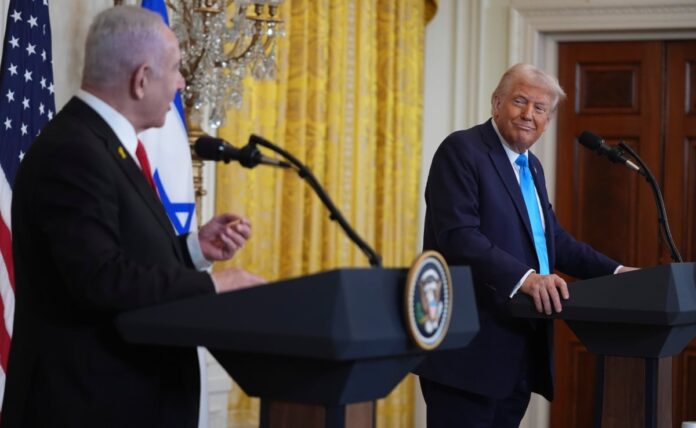Jerusalem:
Donald Trump on Tuesday announced his intent to “take over” and “own” Gaza but despite the US president’s escalating rhetoric there are overwhelming obstacles to his proposal.
The idea aligns with other grandiose schemes he’s floated since returning to the White House, including annexing Greenland or making Canada the 51st US state.
Here are five reasons Trump’s Gaza proposal appears unworkable:
– Palestinian roots –
Trump ignores Palestinians’ deep attachment to their land. After the Gaza ceasefire, half a million displaced people rushed back north.
“This is the happiest day of my life,” one of them, Lamees al-Iwady, said on January 28.
The Palestinian envoy to the UN, Riyad Mansour, dismissed the idea outright.
“Our homeland is our homeland,” he said. “For those who want to send them to a happy, nice place, let them go back to their original homes inside Israel, there are nice places there, and they will be happy to return to these places.”
– Arab opposition –
Contrary to Trump’s assertions, Arab states have firmly rejected the plan.
On Saturday, Egypt, Jordan, Qatar, Saudi Arabia and the United Arab Emirates denounced any “infringement of the inalienable rights” of Palestinians.
Palestinian Authority president Mahmud Abbas went to Jordan on Wednesday to consult King Abdullah II, signalling deep concern in Amman and Ramallah.
Public opinion in Arab states is also expected to be unanimously hostile to the proposal.
“Expect reactions to range from confusion to outrage, including demonstrations across the Middle East and beyond in the coming days,” Emily Harding of the Washington-based Center for Strategic and International Studies wrote on X.
– Intervention fatigue –
Trump’s proposal involves sending US troops into Gaza. Any such deployment would be an immediate reversal of a key campaign promise not to embroil Washington in foreign wars.
Those forces would meet fierce opposition from Palestinian militants Hamas — much weakened by 15 months of war against Israel but by no means eradicated.
Hamas and its ally, Islamic Jihad, have shown the ability to sustain a violent insurgency against a conventional military force of the kind that looms large in the American memory following failed military operations in Afghanistan, Iraq and Vietnam.
– International law –
With an intervention in Gaza, Trump would tear apart international law, the inheritance of the post-war international order that until recently Washington had proudly championed, at least in its rhetoric.
“The US could only take control of Gaza with the consent of the sovereign authority of the territory. Israel can’t cede Gaza to the US,” said Tamer Morris, a specialist in international law at the University of Sydney.
“A government, such as the Palestinian Authority, cannot give this consent on behalf of a people. People have a right to self-determination — the right to determine their own future,” Morris wrote on The Conversation website.
The legal expert added even if Trump’s proposal doesn’t come to fruition, his casual dismissal of international norms is damaging on its own.
“The nonchalant way Trump is discussing things such as taking over a territory and moving a population gives the impression these rules can easily be broken, even if he doesn’t break them himself,” Morris said.
Underlining the legal ramifications of Trump’s proposal, the United Nations reiterated international law strictly prohibits any expulsion of people from an occupied territory.
– Israeli caution –
While Netanyahu and his supporters have appeared emboldened by Trump’s declarations, Israel’s wider political class have appeared cautious as they eye legislative elections in a year’s time.
“The far right is ecstatic, jubilant,” said David Khalfa, a researcher at the Fondation Jean-Jaures in Paris.
“The more moderate, centrist elements of parliament are congratulating Trump but expressing doubts about the feasibility of his plan.”
The researcher pointed to remarks by opposition leader Yair Lapid following Trump’s announcement, stressing the need for Israeli leadership to present plans rather than rely on the United States.
Khalfa said Lapid’s remarks showed the Israeli politician “believes the plan is not at all realistic, or even counter-productive”.
“Trump is fundamentally and above all a businessman,” the Paris-based researcher said.
And the US president’s plan was conceived as “a way of getting all the players in the region on board, to get out of the Israeli-Palestinian face-off, doomed to a repetition of the same tragedy,” he added.
(Except for the headline, this story has not been edited by The Hindkesharistaff and is published from a syndicated feed.)




